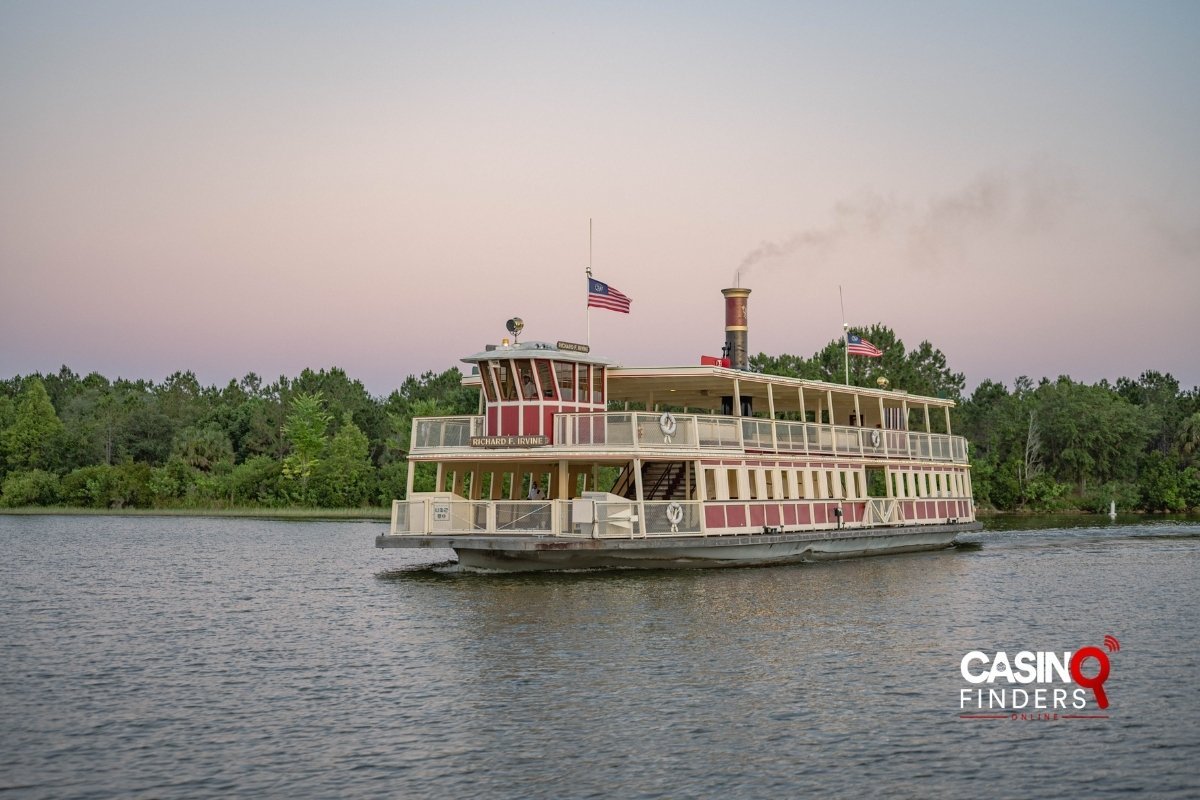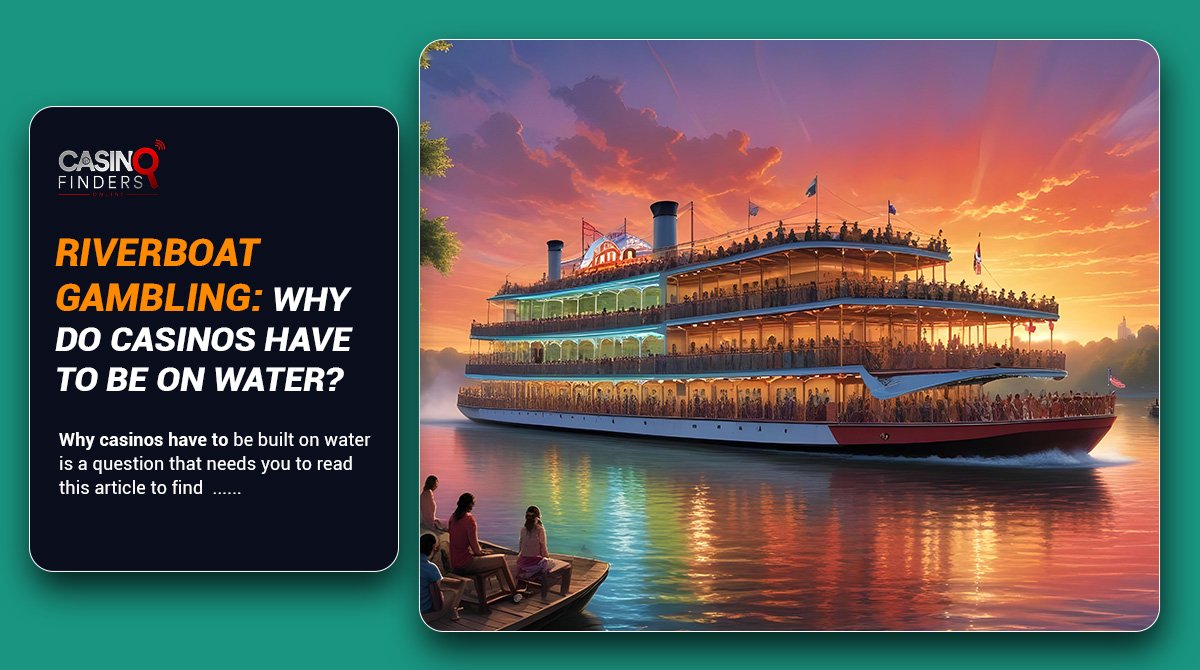Riverboat Casinos Short History

Riverboat casinos started to appear in the early 1990s on the Mississippi River. Although playing on the water was fun, the main reason for building casinos on the water was legality issues. Mississippi was called The Hospitality State at the time and was popular for the steamboats. Such ships became popular because they made state-to-state transportation easy, relaxing, and efficient. Hence, crowds of people appealed to such ships, which made ships operators see an opportunity to add more excitement to people’s travels by offering gambling fun. Being on a boat offered a sense of security as gamblers could not get classified while steaming down a river mid-transit. Because this way, they were not gambling in a specific state. Also, land-based gambling rules did not apply to them.
With the development of railroads in the USA, trains became a more popular transportation means for people. Today, when we say a riverboat casino or a gambling venue on the water, most people think of cruise ships, which is true. In fact, you cannot imagine a luxury cruise without offering gambling services identical to what you see at online USA casino sites.
Not Found.
Water Casinos And Legality Issues
As I have said, the primary reason for casinos built on the water was legal issues. In fact, gambling is still a controversial concept and activity in the United States. No general and definite federal or state law regarding casinos and gambling exists. In some states, like Utah and Hawaii, gambling is still forbidden in all of its forms. Although, bettors from such states can play and bet at legit offshore online sites.
On the other hand, some states, like New Jersey and Nevada, allow every kind of gambling. In contrast, others take more conservative approaches to please different religious organizations and avoid social conflicts. Gambling in such states is allowed in specific locations, and gambling service providers should obtain licenses and operate under stricter rules.
Due to the mentioned strict laws, in the late 20th century, riverboat casinos were used as a loophole in the regulations of various US states where gambling was explicitly prohibited on land. A famous legal principle implying that water gaming may be a possibility in such mentioned states is “what is not banned is allowed.”
Hence, according to the mentioned legal principle, Iowa, Illinois, Missouri, Mississippi, Louisiana, and Indiana were the first states to authorize riverboat casinos. They made them a reality for their residents and a signature to their states.
Today, the gambling industry changed so have the laws related to gambling venues. The situation with cruise ship casinos is a lot less complicated. Because international waters are exempted from gaming laws. In other words, there are no national regulations applied to international waters. Hence, once a ship moves away from the water territory of its docked country, bettors can freely gamble as no gambling law will be enforced. This is a big opportunity for cruise ships to make more money. They offer casino bonuses to encourage patrons and passengers to at least play a hand in blackjack.
US Floating Casinos Review: 6 States With Casinos On Water

As mentioned, gambling laws differ from state to state in the US. For this reason, what states require casinos to be on the water is a common question among gambling fans. Let us answer this question in the following section.
Indiana
In 1993, Indiana passed a law called The Indiana Riverboat Casino Act of 1993. This act allowed riverboat gambling and floating casinos to operate in all major state waterways. Although the 1993 version of the act required all boats to set sail, in 1999, the act was amended and permitted docked gaming and gambling establishments. Bettors can find the full range of casino games on the Indiana riverboat casinos, including blackjack and slots. Although most floating casinos operate on the Ohio River and Lake Michigan, you can find a couple on inner-state rivers.
Illinois
Like Indiana, riverboat casinos in Illinois were only allowed to operate while sailing down the river. However, the Riverboat Gambling Act of 1990 was amended later to allow docked floating casinos to serve bettors. Illinois riverboat casinos offer all traditional casino games, like blackjack, craps, roulette, and slot games.
Missouri
In 1992, Missouri approved riverboat casinos to operate only under some strict restrictions. First, all boats were allowed to service bettors only on two-hour trips. In other words, boats had to return to shore, stop offering gambling services, and wait for the next trip. Second, punters had to pay for alcohol and drinks. In addition, they were only allowed to lose a maximum of $500 per cruise.
In 1996, lawmakers realized the act required amendment. So, they removed the two-hour cruise rule, and by 2008, the $500 loss limit was also removed. Removing these restrictions led Missouri to have one of the most-lucrative gaming industries in the country.
Louisiana
Since Louisiana was one of the biggest US states for floating casinos and gaming establishments, it is no surprise that it now allows for legal riverboat casinos and gambling.
Although you can find tribal and commercial casinos throughout the state, Louisiana’s primary gaming venues are by water. For this reason, you will find various riverboat casinos in this state.
Louisiana lawmakers consider riverboat casinos essential to the state’s tourism industry and economy. Hence, the initial Riverboat Gambling act amendments allow floating casinos to move up 1,200 feet onshore. In addition, floating venues can become land-based casinos if they decide to move their gambling services inland.
Iowa
In 1989, Iowa authorized excursion boats which were allowed to legally serve bettors on the Mississippi River.
The state did not stop there and later allowed racinos and traditional Vegas-style casinos to operate and serve bettors. Excursion boats offer all the classic casino games and gambling services similar to racinos and commercial venues.
Mississippi
Like Louisiana, Mississippi is one of the oldest states in terms of riverboat gambling. In 1990, Mississippian Lawmakers officially legalized floating gaming and gambling.
Mississippi developed into one of the US’s most thriving water-based gaming industries, with astonishing floating casinos on the Gulf Coast and Mississippi River. Unfortunately, in 2005, Hurricane Katrina wiped out many of the Gulf Coast casinos. For this reason, lawmakers amended the previous acts and allowed casinos to be built up to 800 feet onshore.
Thanks to the state’s lawmakers, Mississippi has a very lucrative gaming industry at the time being. There is no betting limit in this state, and venues operate 24/7. Bettors can find all casino games on the Mississippian riverboat casinos, including blackjack, craps, baccarat, and slots.
To Sum It Up
In this article, I tried to answer why casinos have to be on the water. In the US, riverboat casinos and gambling have a long history. In fact, this became a part of the country’s culture. Although some states, like Utah, are still against all kinds of gambling, other states have evolved over the years and legalized riverboat casinos and even land-based gambling.
The Best USA Online Casinos





 Written by
Written by 



 Cashback Bonus
Cashback Bonus























